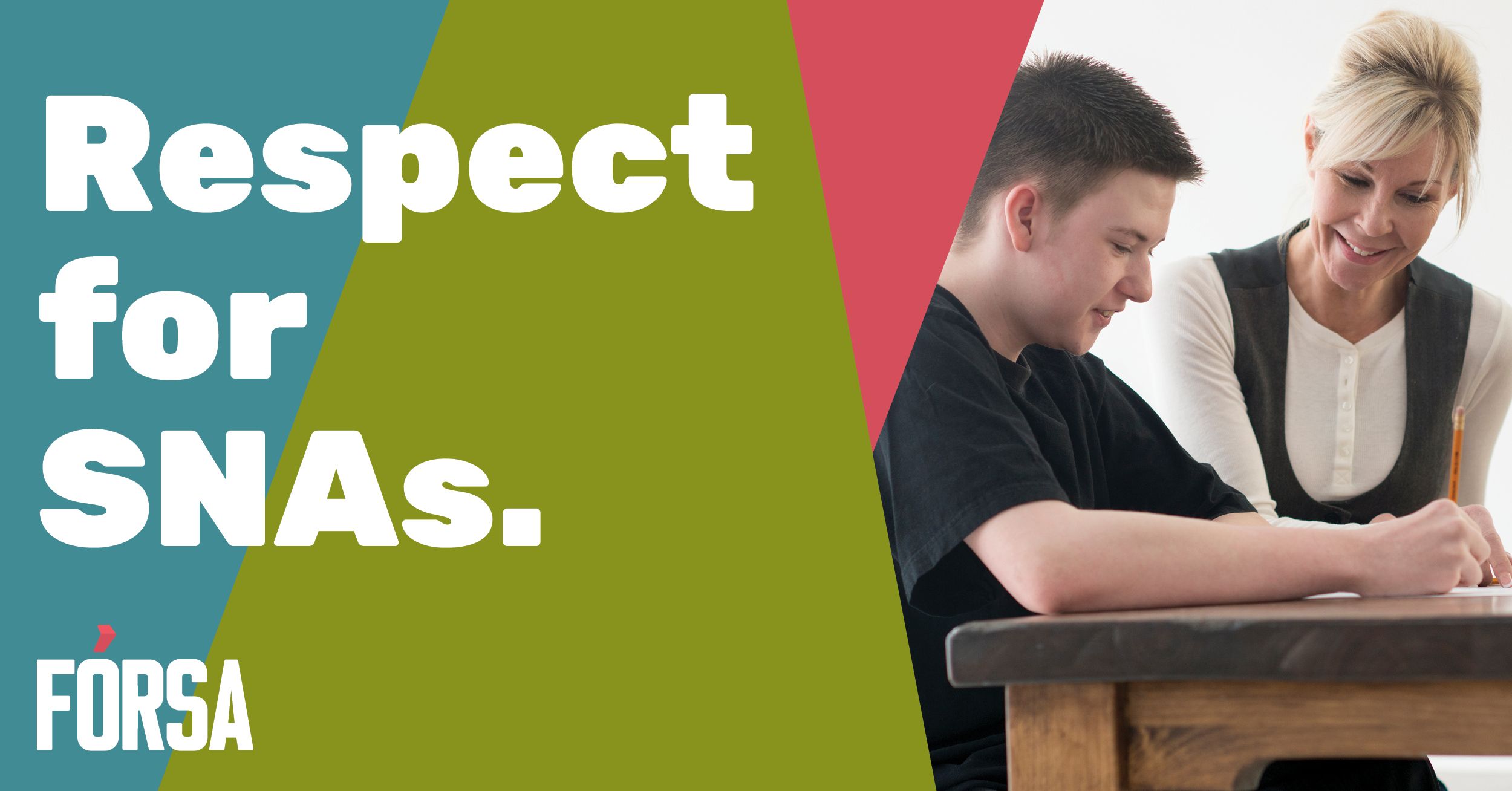Fórsa has welcomed minister Josepha Madigan’s support for a review of minimum qualifications for special needs assistants (SNAs), and for accrediting the UCD national SNA training programme.
Ms Madigan, who is minister of state with responsibility for special education, today (Tuesday) told members of the Oireachtas Education Committee that she believed the minimum qualification should be reviewed before the end of 2022, and then changed.
She also told committee members that departmental officials were engaged in an intensive process with UCD to consider accreditation of the SNA course, and that she believed this process would be completed by the end of the year.
Fórsa’s head of education, Andy Pike said today’s ministerial commitments were a significant step towards achieving genuine respect for SNAs. “We now have to ensure that the Department of Education delivers on the policy commitments made to the joint education committee,” he said.
Earlier, Mr Pike told the committee that the refusal of successive governments to update the minimum qualification required to become a special needs assistant (SNA) had let down staff, students and schools, according to Fórsa. The qualification was last reviewed 43 years ago.
The Oireachtas committee was taking evidence on the need for revised criteria for special needs assistant (SNA) qualifications.
The union, which represents over 12,000 SNAs, today (Tuesday) told the Oireachtas joint committee on education that the minimum qualification of three junior certificate ‘D’ grade passes was outdated and failed to reflect the role and responsibilities of staff supporting children with special educational needs.
The Oireachtas committee was taking evidence on the need for revised criteria for special needs assistant (SNA) qualifications.
Mr Pike told the committee that most schools sought much higher qualifications than the official minimum when hiring SNAs.
“The perception of all occupations is defined by the qualifications required to enter the profession, and the list of stakeholders who believe the time has come to change the status quo includes school management bodies, the National Council for Special Education (NCSE), the Irish Primary Principals’ Network (IPPN), the second level students’ union, a range of academic experts, and all the teaching unions. They all believe that the role of the SNA has developed to the extent that a new, higher qualification level is required,” he said.
Niamh Jordan, who has been an SNA in a mainstream school for 22 years, told the committee how she used techniques like the ‘nurture room,’ ‘zones of regulation,’ and the ‘braincalm programme’ in her work with children. “We use a variety of therapy-based but fun activities to help children organise their brains and return to the classroom calm, focused, alert and ready to learn. Though it’s not a replacement for therapy, it gives parents and school staff a programme to help the child while they are on the waiting list for therapy, or as an add-on to the therapy they receive outside of school,” she said.
The official educational qualification for entry into the profession belies the complexity, skills and training needed.
Linda O’Sullivan, an SNA who works with students in a primary school early intervention special class, said the official educational qualification for entry into the profession belies the complexity, skills and training needed. “Jobs advertised on educationposts.ie or other jobs websites display the real entry requirements, with some seeking honours degrees to Level Eight on the national framework of qualifications. That’s a far cry from the official entry requirement of three junior certificate ‘D’ grade passes. The continued pretence that this is what it takes to be an SNA in 2022 is an insult to those performing this crucial role in classrooms across the country every day,” she said.
Noreen O’Mahoney, an SNA for 15 years who also chairs Fórsa’s Education Division, told the committee that SNAs do much more than care for the “wonderful children” they work with. “We help carry out speech and language, occupational therapy, and physio programmes. We help the children access the curriculum thorough resources, games and extra help. We help with programmes like literacy liftoff, Edmark and many others. We support children emotionally and with behaviours that challenge. My school is not unique. SNAs all around the country are highly skilled professionals, but we need the Department of Education to recognise this and raise the entry qualifications,” she said.
Mr Pike told the committee that a 2018 comprehensive review of the special needs assistant scheme, conducted by the National Council for Special Education (NCSE), found that SNAs were often expected to meet complex needs without adequate training, qualifications, or clinical oversight. It said this work – and a required development of the SNA role to encompass the provision of therapies and building social skills – required higher qualification levels.
In 2015, NUI Galway published research that recommended a mandatory Level Seven qualification for SNAs, leading to a Level Eight qualification through career development.
The parents of a child with additional needs have an expectation that the SNA has education and training appropriate to meet the needs of their child.
Mr Pike said: “The expectations of parents and students also matter. The parents of a child with additional needs want their SNA to form a bond, to be empathetic, and to be caring. They also have an expectation that the SNA has education and training appropriate to meet the needs of their child.
“That’s why Fórsa has a claim with the education department seeking an expert review of the minimum SNA qualification, with agreed terms of reference and a commitment from the minister that the recommendations will be implemented.”
Fórsa has also been demanding accreditation for the new national SNA training programme, delivered by the UCD School of Education, which was established on foot of the NCSE review. The first cohort of 500 students completed the programme in February 2022.
“SNAs completed this complex programme, consisting of 80 hours of teaching with written assessments, without any academic recognition of their achievements,” said Mr Pike.

